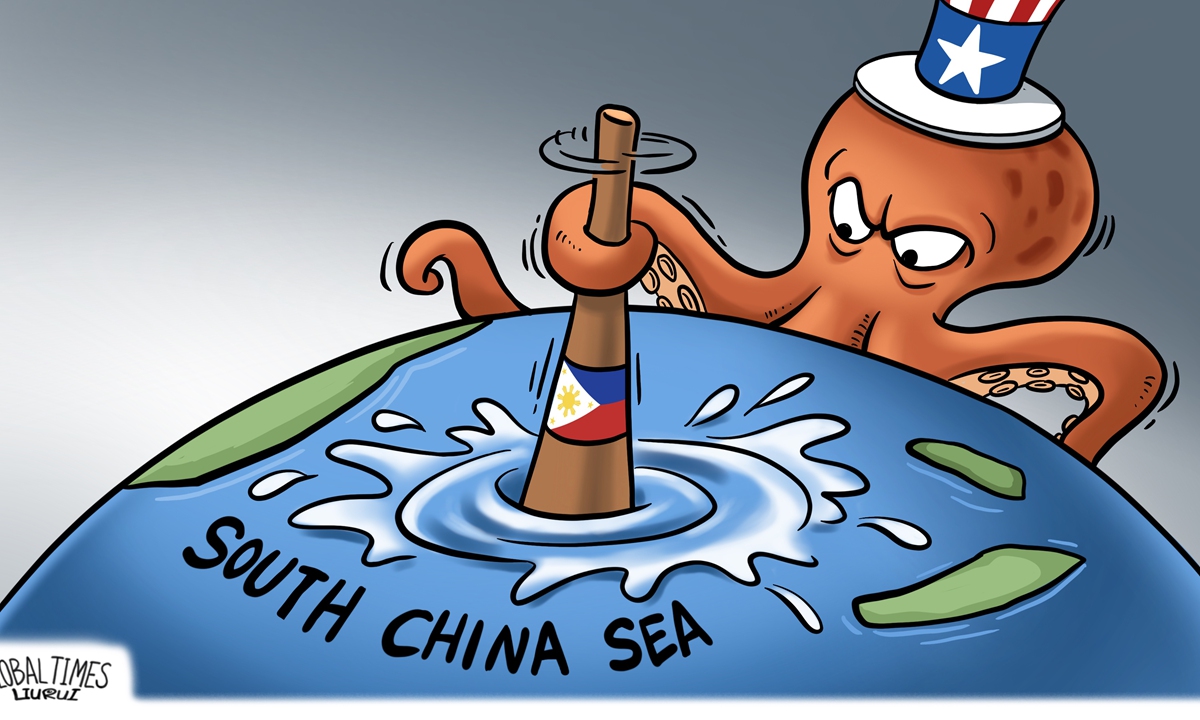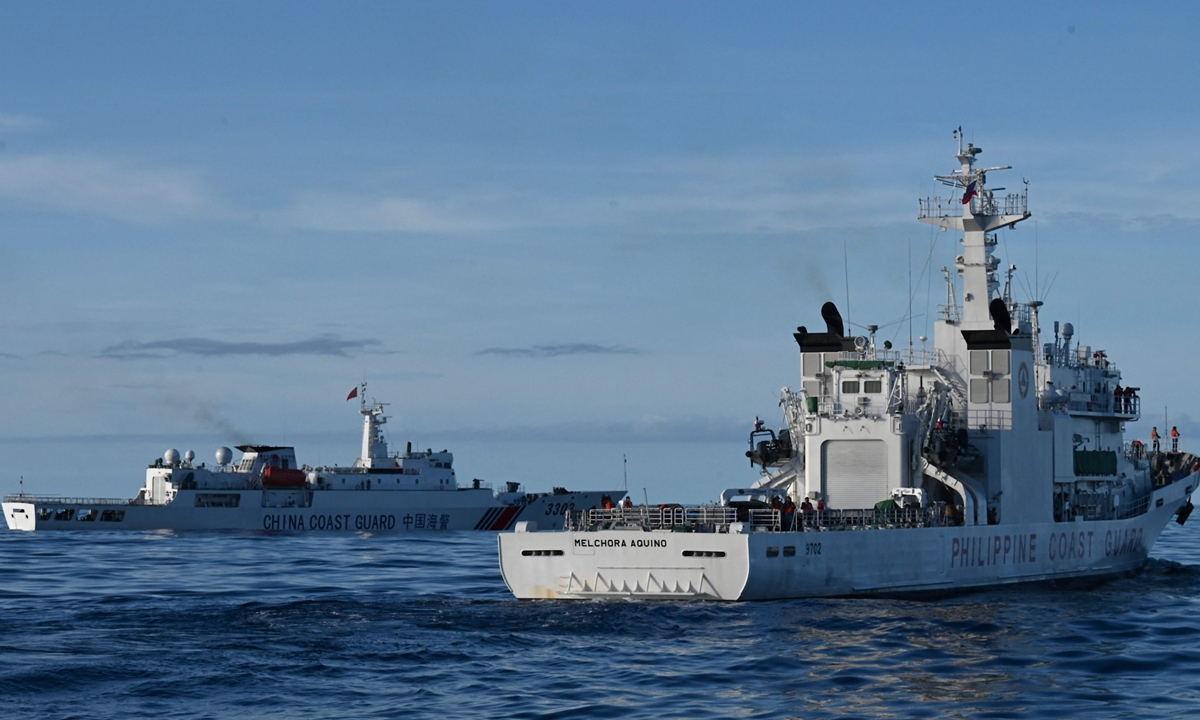US interfering hinders peaceful settlement of South China Sea issue: Philippine scholar

US in South China Sea Illustration:Liu Rui/GT
Editor's Note:Philippine President Ferdinand Marcos Jr embarked on his trip to Vietnam on Monday this week, in a bid to solidify their maritime cooperation. What does this state visit suggest? How will the situation in the South China Sea evolve in 2024? Why shouldn't the US interfere in the disputes between Manila and Beijing? Rommel C. Banlaoi (Banlaoi), the Chairman of the Philippine Institute for Peace, Violence and Terrorism Research, shared his insights on the current situation in the South China Sea with Global Times (GT) reporter Wang Zixuan.
GT: During the eighth meeting of the China-Philippines Bilateral Consultation Mechanism on the South China Sea on January 17, China and the Philippines agreed to "improve maritime communication and properly manage conflicts through friendly talks" regarding the South China Sea. What signal does this meeting show?
Banlaoi: This meeting on the bilateral consultative mechanism is an important event, because it opens the channel of policy development between the two parties. But if you look at the agenda and the outcome of the meeting, nothing was new in the discussion. What we need now for the two countries is to review our achievements in bilateral consultative mechanisms.
As early as 2018, the two countries already established working groups in the areas of fisheries, oil and gas, marine scientific research and political security. The two parties need to review the gains that we made from those working groups and then proceed with cooperation. The two parties under the Marcos administration don't need to reinvent the wheel because we have already achieved something in the past. What we need now is to identify areas where we can implement those that have been achieved, and have practical cooperation in the South China Sea.
GT: Philippine President Marcos recently congratulated the winner of Taiwan's regional leader election and said he was "looking forward to close collaboration," then he reiterated his support for the one-China principle. Some said the president was taking risks. What's your take on his statement on Taiwan?
Banlaoi: The statement of President Marcos is sensitive to the Chinese mainland. I think he already corrected his statement and made it clear that he did not mean to violate the one-China principle. I think it is very important to clarify his intention. We need to take into account that President Marcos has made that kind of statement due to the close relationship with the US. But I think our government is clear that we uphold that Taiwan is a province of China.
GT: Last December, you mentioned in an event that the escalated tensions in the South China Sea are partly due to US attention on this issue. How are the China-Philippines relations influenced by the US? What negative impacts does the US bring on regional stability and cooperation?
Banlaoi: The involvement of the US in the South China Sea using the Philippines is complicating the peaceful settlement of disputes. I support the Chinese government's position that parties must uphold direct negotiations and consultations and no other parties are to interfere in the process.
I oppose the current approach of the Philippine government under President Marcos, which is excessively involving the US in not only the South China Sea, but also in sensitive issues, like the Taiwan question. For example, the president has allowed the expansion of the Enhanced Defense Cooperation Agreement (EDCA) that is sensitive to our close neighbor China.
I continue to uphold the principle that the US should not be involved in the South China Sea issues, because the South China Sea issues can only be settled through direct negotiations and consultations of the parties concerned.
GT: You also emphasized the de-escalation of the tensions between China and the Philippines. Many Chinese people are curious about the attitude of the Filipinos toward the Philippines' current policy in terms of the South China Sea. How will the situation in the South China Sea evolve in 2024? What's the public opinion in the Philippines?
Banlaoi: There is a very strong nationalism of Filipinos on the issue of the South China Sea, but I think the public is being misled on the real issue in this region, because the Philippines is being controlled by Western media, and even our newspapers are articulating a lot of the Western perspectives..
That is why our academics are challenging that kind of perspective and educating our people. Many of the reactions of our countrymen on the issue of the South China Sea are in fact born out of ignorance, and we can't blame them because they can only rely on the information that they get from social media, public media and broadcast media, which are controlled by the West.
Hence, we are presenting a counter-narrative, that is, the disputes can be settled peacefully and there are a lot of prospects for cooperation in the South China Sea that will bring more benefits to all parties concerned. One of the most important ways to de-escalate the current tensions in the South China Sea for both parties is to avoid hostile actions against each other, uphold a more reconciliatory attitude and emphasize the need to cooperate rather than compete. That's the main objective of the bilateral consultative mechanism, and the US can only complicate it.
We also need to develop another mechanism to talk with the US about how it should behave more responsibly in the South China Sea, because the US' actions in this region are creating security concerns. For me, it will be better if the US allows the parties concerned to settle the problem by themselves.
GT: Philippine President Marcos visited Vietnam this week to discuss maritime cooperation. Vietnam has a balanced stance between China and the US and it has put aside disputes over the South China Sea. What do you think of this visit? Will the Philippines and Vietnam have some consensus on this issue?
Banlaoi: We have different levels of bilateral relationship with our ASEAN neighbors, and we have a strategic partnership with Vietnam. I think the visit of the Philippine President to Vietnam is to seek clarification from Vietnam on why Vietnam is pursuing closer cooperation with China and upholding the concept of a shared future with China.
I think that's the main objective of the Philippine government. We want greater cooperation with Vietnam, and at the same time, we also want to hear from Vietnam on how it is forging closer cooperation with China. If Vietnam can explain it to our president, I think that will create a great breakthrough for the Philippine government to learn lessons from Vietnam in terms of cooperating with China.
The Philippines and Vietnam also have a difficult relationship with China when it comes to territorial conflict. But Vietnam has a way to settle the conflict with China. I hope that our government will learn lessons from the current approach of Vietnam because it is in the interest of the Filipino people. It is also in the interest of the Philippines state to have a friendly relationship with China and uphold a shared future with China. If we can do that, we can peacefully settle our disputes in the South China Sea.
GT: Some observers believe that the Philippines has been adopting "microphone diplomacy" on the South China Sea issue. What's your take on the so-called microphone diplomacy? What advice would you give to the government to improve the policy and control the conflict?
Banlaoi: We don't need microphone diplomacy. Microphone diplomacy can't peacefully settle disputes. It can only worsen the situation. If we really want a peaceful settlement of disputes in the South China Sea, what we need is development diplomacy, what we need is economic diplomacy, and what we need is cooperative diplomacy. Microphone diplomacy is counterproductive in the peaceful settlement of disputes.
GT: You have once been accused of spying for China, but you are not afraid of this accusation and continue your career. Where do you get your courage from and what keeps you so committed to the friendly relationship between China and the Philippines?
Banlaoi: I believe that the friendly relationship with China will benefit the Filipino people. We can't benefit from having a hostile relationship with China. Based on my research as a scholar, the Philippines and China have a very long history of friendship for centuries. These anti-China sentiments are not natural to the Filipinos. These are all a product of our experiences of being colonized by Western countries in the past and that is why I am advocating a renunciation of colonial mentality.
Viewing China as a threat or an enemy is part of our colonial mentality and that is why I'm not afraid to promote a friendly relationship with China. Now they accuse me of spying for China. I think if some people lose arguments, they use a lot of labels and accusations. But I continue to argue. Personally, I'm not afraid of those accusations because those accusations are not true. I admit that I share knowledge with my counterparts in China and the rest of the world, so that we can have a better understanding and a better way to cooperate with each other.


